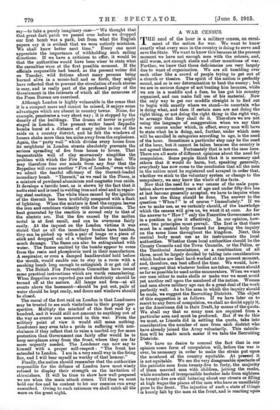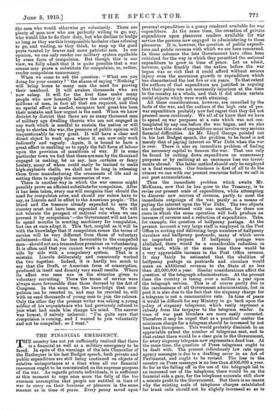A WAR CENSUS.
THE need of the hour is a military census, an enrol- ment of the nation for war. We want to know exactly what every man in the country is doing to serve and
save the State. We want to know this because at the present moment we have not enough men with the colours, and, still worse, not enough shells and other munitions of war.
Further, we know that these deficiencies are very largely due to want of organization. We are all tumbling over each other like a crowd of people trying to get out of a church or theatre. The spirit of the nation is perfectly sound, and so is our determination to beat the enemy ; but
we are in serious danger of not beating him because, while we are in a muddle and a fuss, he has got his country organized, and can make full use of his material. Now the only way to get our muddle straight is to find out to begin with exactly where we stand—to ascertain who is doing what, and then if certain men are not doing the right thing, or not doing the right thing in the right way, to arrange that they shall do it. Therefore we are not using the language of exaggeration when we say that a war census under which, in effect, every man will have to state what he is doing, and, further, under which men will be enrolled in categories according to ago, is the need of the hour. Sometimes a particular step may be the need of the hour, but it cannot be taken because the country is not agreed thereon. Fortunately that is not the case here. There are all sorts of different opinions about the need for compulsion. Some people think that it is necessary and others that it would do harm, but, speaking generally, everybody has now come to the conclusion that all the teen in the nation must be registered and arrayed in order that, whether we stick to the voluntary system or change to the compulsory, we may know the whole of the facts.
Now that the need for a war census of the male popu- lation above seventeen years of age and under fifty-five has at last become generally accepted, we have to inquire when and how the thing should be done. The answer to the question "When 1" is of course "Immediately." If we are to make use, as we certainly should, of the knowledge which the census will give us, we want it at once. As for the answer to" How ?" only the Executive Government are in a position to give it effectively. In our opinion, how- ever, two principles must prevail. The first is that there must be a central body formed for keeping the inquiry on the same lines throughout the kingdom. Next, this central body moat use as its instruments the local authorities. Whether these local authorities should be the County Councils and the Town Councils, or the Police, or the Territorial Associations, or a combination of all three, must be largely decided by taking into consideration which bodies are least hard-worked at the present moment, and, therefore, can best afford the time. We would, how- ever, suggest that whatever bodies are taken, women should as far as possible be used as the enumerators. When we want our men either to make shells or make war we must avoid yet another call upon the manhood of the nation. Women and men above military age can do a great deal of the work perfectly well. As to the area in which the inquiry should be made, we suggest the Recruiting Districts. The object of this suggestion is as follows. If we have later on to resort to any form of compulsion, we shall no doubt apply it, as the Americans did in their Draft, by means of the quota. We shall say that so many men are required from a particular area and must be produced. But if we do this we must, as Lincoln did in settling the quota, take into consideration the number of men from each district who have already joined the Army voluntarily. This calcula- tion will be made much easier if we take the Recruiting Districts.
We have no desire to conceal the fact that in our opinion some form of compulsion will, before the war is over, be necessary in order to make the strain put upon the manhood of the country equitable. At present it is not equitable. We see the very disagreeable spectacle of the patriotic men from twenty-five to forty, the majority of them married men with children, joining the ranks, while numbers of irresponsible bachelor lads from eighteen to twenty-five are still loitering about our streets or filling at high wages the places of the men who have so unselfishly gone to the front. The injustice of such a state of things is keenly felt by the men at the front, and is reacting upon
the men who would otherwise go voluntarily. There are plenty of seen now who are perfectly willing to go, nay, who would like to do their duty, but who decline to budge as long as they see this irresponsible bachelor class refusing to go, and waiting, as they think, to snap up the good posts vacated by braver and more patriotic men. In our opinion, we can only render our military system equitable by some form of compulsion. But though this is our view, we fully admit that it is quite possible that a war census may prove a substitute for compulsion, or, rather, render compulsion unnecessary. When we come to ask the question: "What are you doing for your country ?" the shame of saying " Nothing " will bring home to many men the need for proving their manhood. It will awaken thousands who are now asleep. It will for the first time make many people who now honestly believe the country is getting millions of men, in fact all that are required, and that no special effort is needed, recognize how great has been their mistake and how urgent is the need. When we know district by district that there are so many thousand men of military age dwelling therein who are not engaged in any work which is needful to sustain the nation or will help to shorten the war, the pressure of public opinion will unquestionably be very great. It will have a clear and direct object to work upon where it can now only work indirectly and vaguely. Again, it is bound to have a great effect in enabling us to apply the full force of labour upon the provision of munitions of war. If in some particular town we find that there are men by the thousand engaged in making, let us say, lace curtains or fancy hosiery, many of whom could easily be trained to make high-explosive shells, we shall not be long in releasing them from manufacturing the ornaments of life and in setting them to supply the necessaries of war.
There is another way in which the war census might possibly prove an efficient substitute for compulsion. After it has been taken, every one will recognize that should the need for compulsion arise, and should our rulers have to say, as Lincoln said in effect to the American people : The blood and the treasure already expended to save the country must not have been expended in vain. We will not tolerate the prospect of national ruin when we can prevent it by compulsion '—the Government will not have to spend months in erecting machinery for compulsion, but can at once adopt it. This fact, coupled as it will be with the knowledge that if compulsion comes the terms of service will be very different from those of voluntary enlistment—that is, far less favourable to the compelled men—should act as a tremendous premium on volunteering. It is often said that you cannot work a voluntary system side by side with a compulsory system. That is a mistake. Lincoln deliberately and consciously worked the two together. Indeed, it is hardly too much to say that the Draft, or American form of conscription, produced in itself and directly very small results. Where its effect was seen was in the stimulus given to voluntary recruiting. There the terms of service were always more favourable than those decreed by the Act of Congress. In the same way, the knowledge that com- pulsion can be resorted to, and may be resorted to, will with us send thousands of young men to join the colours. Only the other day the present writer was asking a young soldier of his acquaintance who had previously refused to join what had made him change his mind. The answer was honest, if naively unheroic : "I'm quite sure that compulsion is coming, and I wanted to join voluntarily and not be compelled; so I went."



































 Previous page
Previous page